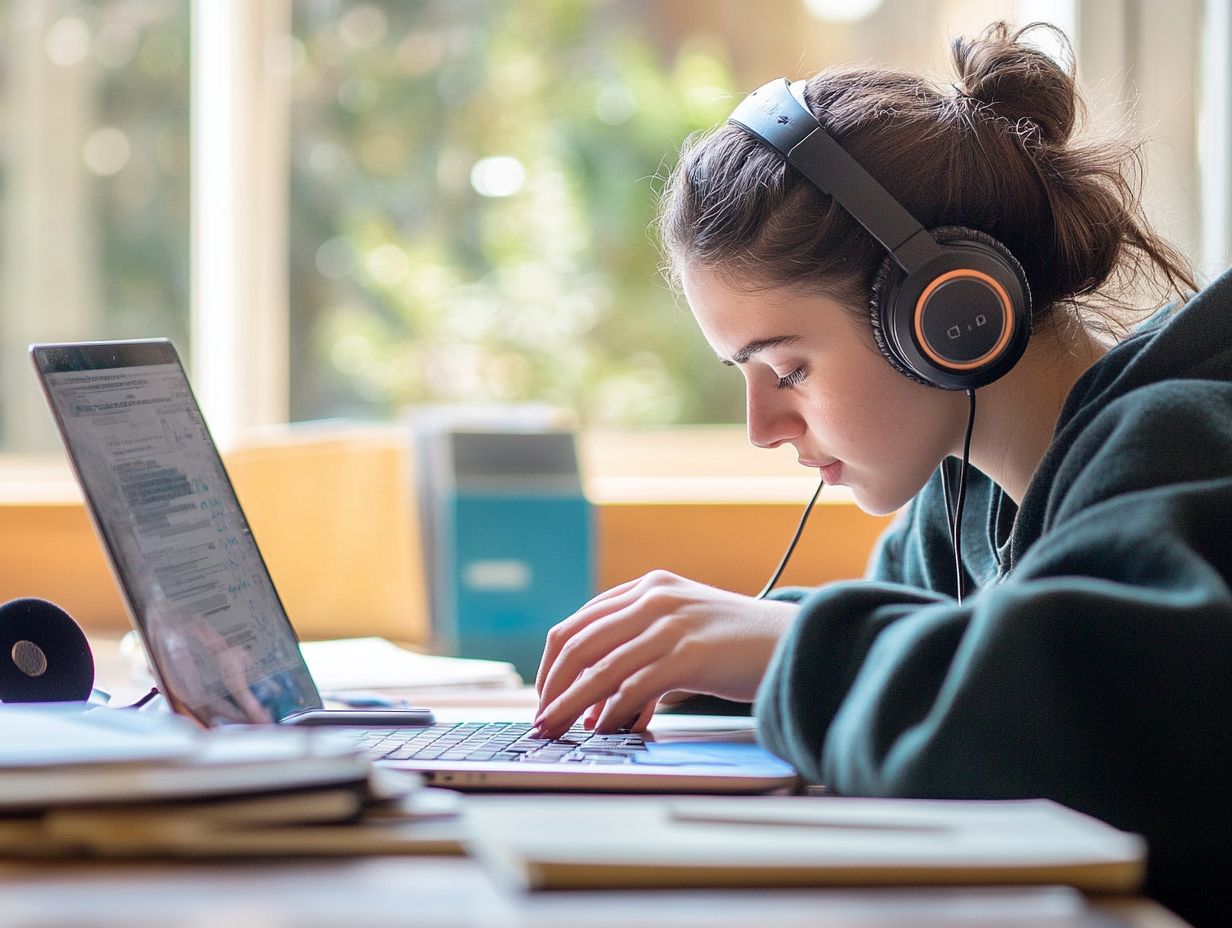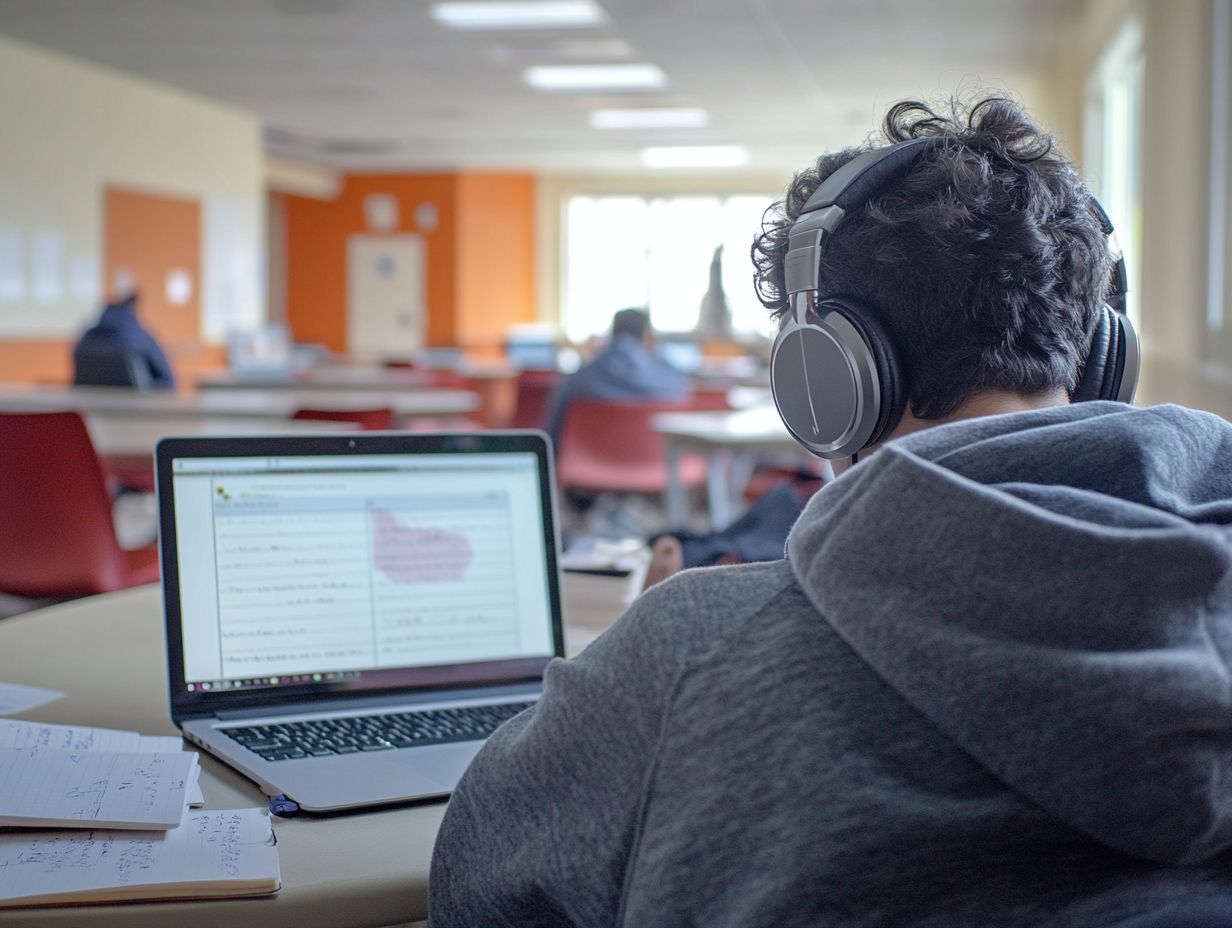study techniques for auditory learners
Auditory learning stands out as a highly effective method for absorbing information, emphasizing the power of listening and sound to deepen your understanding.
This article delves into the essence of auditory learning, outlining its key characteristics and the many benefits it offers. You’ll uncover practical study techniques specifically designed for auditory learners, including active listening strategies and the integration of diverse audio resources.
You’ll also find useful tips on crafting an optimal study environment and incorporating movement to enhance retention. Whether you re a student or a lifelong learner, this guide will empower you to harness the full potential of auditory learning.
Contents
- Key Takeaways:
- Understanding Auditory Learning
- Benefits of Auditory Learning
- Study Techniques for Auditory Learners
- Creating an Ideal Study Environment
- Additional Tips for Auditory Learners
- Frequently Asked Questions
- What are the best study techniques for auditory learners?
- How can I improve my study skills as an auditory learner?
- Can listening to music help me study as an auditory learner?
- Are there any specific study techniques that are not recommended for auditory learners?
- What are some ways to stay engaged while studying for auditory learners?
- How can I effectively prepare for a test as an auditory learner?
Key Takeaways:

Auditory learning is a style where individuals learn best by listening and hearing information rather than reading or seeing it. Active listening fully focusing on what someone is saying strategies and utilizing audio resources can greatly improve learning for auditory learners.
To create an ideal study environment, auditory learners should minimize distractions and utilize audio learning opportunities while also incorporating visualization techniques and movement into studying.
Understanding Auditory Learning
Auditory learning is a distinctive style where individuals primarily absorb information through listening, making the most of sounds and listening in their educational experiences.
As an auditory learner, you may shine in settings that prioritize verbal directions and discussions. You might find that you retain information more effectively through engaging conversations and insightful lectures.
Recognizing the characteristics of auditory learners can significantly enhance your educational journey. This understanding allows educators to tailor their teaching strategies and design classroom environments that capitalize on your strengths while addressing the challenges inherent to this learning style. Experts such as Grace Fleming from Georgia Southern University highlight its importance.
Definition and Characteristics
Auditory learning is defined by your preference for listening as the primary way to absorb information, allowing you to thrive in environments that emphasize verbal communication and oral presentations.
You likely possess strong listening skills, enabling you to catch details and nuances in conversations and lectures that others might overlook. Your remarkable memory for spoken information allows you to retain and recall facts and concepts shared verbally, making you adept at navigating classroom discussions.
This natural inclination toward spoken dialogue shapes your study strategies. For example, you might find it beneficial to recite notes aloud or engage in group discussions to reinforce your learning. You often excel in settings where dialogue is encouraged, as your ability to articulate your thoughts enhances collaborative efforts, enriching both your learning experience and that of your peers.
Benefits of Auditory Learning
The advantages of auditory learning are abundant, especially for students who excel in an environment that prioritizes verbal instructions and encourages active participation in discussions.
This approach truly boosts your understanding and retention of the material.
How It Can Improve Learning
Auditory learning strategies can significantly enhance your ability to retain information. Adopting effective study tips like recording lectures and actively participating in discussions can be particularly beneficial.
By recording lectures, you give yourself the opportunity to revisit complex topics at your own pace, reinforcing your understanding in a way that suits you best. Engaging in group discussions allows you to articulate your thoughts while hearing diverse perspectives, which deepens your comprehension even further.
Creating an optimal learning environment can be as simple as incorporating calm, non-intrusive background music. This technique not only helps you focus better but also reduces distractions, making your overall study experience more enjoyable and effective.
These strategies contribute to a richer learning atmosphere that truly caters to your strengths as an auditory learner.
Study Techniques for Auditory Learners

For auditory learners, embracing effective study techniques and strategies is important to fully harnessing their distinct learning style.
Consider methods such as recording lectures or partnering with a study buddy. These approaches can significantly enhance understanding and retention of the material.
Active Listening Strategies
Active listening strategies are crucial for auditory learners. They enable full engagement with the material and enhance group participation.
Summarizing information aloud reinforces understanding and clears up misconceptions. Asking focused questions deepens exploration of topics and ensures grasp of core concepts.
Taking detailed notes during lectures aids memory retention. These notes serve as valuable resources for future review.
By implementing these strategies, you can actively participate in discussions. This leads to a more enriching learning experience while enhancing your overall retention and comprehension of the material.
Utilizing Audio Resources
Dive into audio resources now! They will boost your auditory learning strategies, allowing you to explore the material through lectures, podcasts, and audiobooks tailored to your unique study techniques.
Incorporating these diverse audio elements into your study routine cultivates a vibrant and dynamic learning environment that caters specifically to your auditory preferences.
Podcasts, for instance, present engaging discussions on a wide array of subjects, often in an accessible format. This invites you to explore beyond the confines of traditional textbooks.
Recorded lectures offer the invaluable opportunity to revisit complex topics at your own pace. This ensures that essential concepts are fully understood.
Meanwhile, audiobooks transform stories and academic texts into immersive experiences. This enhances information retention and makes the learning process genuinely enjoyable.
Creating an Ideal Study Environment
Crafting the perfect study environment for auditory learners requires thoughtful strategies. These strategies minimize distractions while amplifying audio learning opportunities.
Create a vibrant learning atmosphere that helps students thrive and achieve their full potential.
Minimizing Distractions
Minimizing distractions is crucial for auditory learners. This enhances focus and retention of information, ultimately positioning learners as effective participants in study groups and classroom discussions.
To create the ideal setting for your learning style, consider investing in noise-canceling headphones. They can effectively block out pesky background noises that threaten to disrupt your concentration.
Choosing a dedicated quiet study space be it a cozy nook at home or a secluded corner in the library will further bolster your learning process.
Implementing strategies to eliminate digital distractions is also key. Silencing notifications and using focus-enhancing apps can help maintain an uninterrupted flow of thought.
By applying these practical tips, you can cultivate an environment that encourages deep engagement while fostering seamless collaboration with your peers.
Maximizing Audio Learning Opportunities

Maximizing audio learning opportunities is essential for auditory learners. These strategies can significantly enhance engagement and understanding in the classroom.
Incorporating group discussions allows sharing insights and clarifying concepts with peers. This turns listening into a dynamic, interactive experience.
Listening to recorded lectures provides the repetitive reinforcement necessary for solid retention of material.
By utilizing multimedia resources like podcasts and educational videos, you can introduce diverse perspectives that break the monotony. This stimulates interest even further.
Integrating these techniques into a well-rounded study routine deepens comprehension and accommodates different learning styles. This creates a more inclusive educational experience for everyone involved.
Additional Tips for Auditory Learners
For auditory learners, consider integrating visualization techniques and incorporating movement into your study sessions. This approach can significantly elevate your engagement and improve information retention, creating a dynamic learning environment that caters to your unique learning style!
Using Visualization Techniques
Employing visualization techniques can greatly enhance your learning experience, especially if you’re an auditory learner. By creating vivid mental images, you can improve your information retention and deepen your understanding of complex concepts.
When you combine auditory input, like lectures or podcasts, with visual aids such as vibrant charts and diagrams, you create a powerful synergy that significantly elevates your comprehension. Linking sounds with corresponding visuals makes it easier to understand and remember the material.
For example, integrating infographics into your discussions can help you forge connections more effectively, turning abstract ideas into tangible representations. This harmonious blend of learning styles not only makes your study sessions more engaging but also equips you with the tools needed to navigate intricate subjects with confidence!
Incorporating Movement into Studying
Incorporating movement into your study routine can significantly benefit auditory learners, as physical activity enhances cognitive function and promotes better retention of information!
Walk while you listen to lectures or use purposeful gestures during discussions to effectively boost your focus and retention. This dynamic approach streamlines your study process and helps maintain your energy levels, reducing fatigue from prolonged sitting.
Transitioning between different postures or adding light stretches can stimulate your mental alertness, allowing you to absorb complex concepts more easily.
These movement-based techniques create an interactive study environment, transforming your learning experience into a more engaging and productive endeavor.
Frequently Asked Questions
What are the best study techniques for auditory learners?

Some effective study techniques include listening to recordings of lectures, using memory aids to remember information, discussing and summarizing material with a study partner, and recording yourself reading notes and listening back to them.
How can I improve my study skills as an auditory learner?
To improve your study skills, try to find quiet, distraction-free environments, take frequent breaks to avoid mental fatigue, and practice active listening during lectures and discussions!
Can listening to music help me study as an auditory learner?
It depends on the individual and the type of music! Some auditory learners find instrumental music helps them focus, while others find it distracting. Try it out and see what works best for you!
Are there any specific study techniques that are not recommended for auditory learners?
Some techniques that may not be as effective include studying in noisy environments, relying solely on visual aids like flashcards, and trying to memorize information without actively engaging with it.
What are some ways to stay engaged while studying for auditory learners?
To stay engaged, try reading aloud, using different voices or intonations to represent different ideas, taking notes in your own words, and incorporating sound effects or music into your study materials!
How can I effectively prepare for a test as an auditory learner?
Record yourself reciting key information and listen to it multiple times. Practice active recall by answering questions or summarizing material out loud, and use memory aids to remember important concepts!






